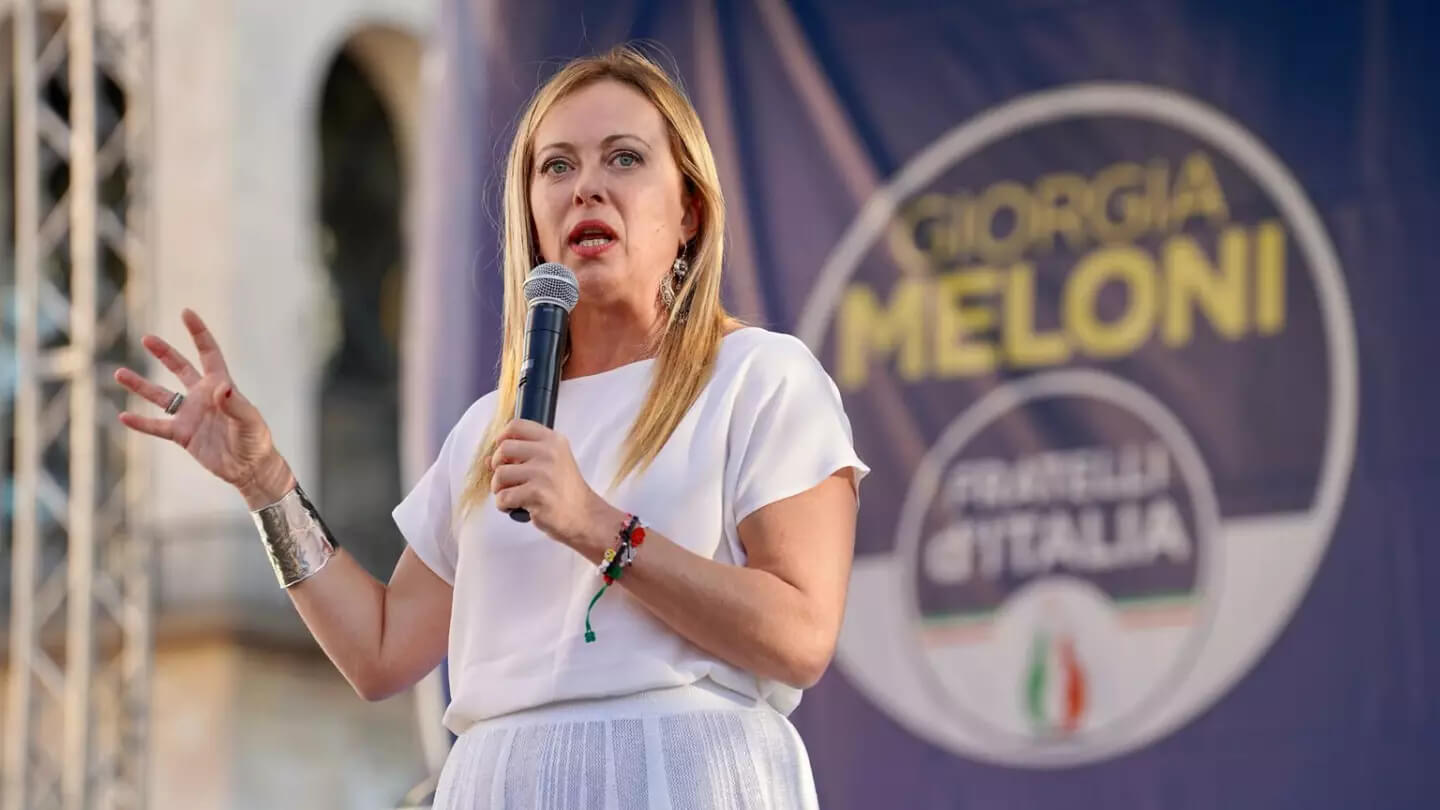Far-right leader Giorgia Meloni’s coalition emerged victorious in Italy’s parliamentary election on Sunday after securing 43% of the votes, setting the stage for her to be appointed as the country’s first female Prime Minister (PM).
Meloni said the result gave a “clear indication” that the country wants the “centre-right to guide Italy.” She lamented the “violent electoral campaign” that attacked her but nevertheless vowed to ensure “reciprocal respect” and recreate “trust in the institutions.” She declared, “We are at the starting point … Italy chose us, and we will never betray it.”
Meloni’s allies, the League party and Forza Italia, secured 9% and 8% of the votes, respectively. Meloni’s Brothers of Italy party won 26% of the votes and emerged as the single largest party, making her the most likely candidate for PM. Meanwhile, the main opposition party, the Democratic Party, won merely 19% of the votes.
While the election result was announced on Monday, the new parliament will only be set up in the coming weeks after the far-right coalition deliberates on how to form the government.
Non tradiremo la vostra fiducia. Siamo #pronti a risollevare l’Italia
— Giorgia Meloni 🇮🇹 ن (@GiorgiaMeloni) September 26, 2022
GRAZIE! 🇮🇹 pic.twitter.com/DabIIuhORK
The Brothers of Italy’s rise to prominence is a significant change in Italian politics, given that it secured just 4% of the votes back in the 2018 election. Some analysts have attributed this in part to this year’s record-low voter turnout of 64%.
It also heralds the entry of parties with Nazi and fascist roots, which have historically been sidelined, into mainstream politics. In fact, this will be Italy’s most right-wing government since fascist leader Benito Mussolini in World War II.
In fact, the Brothers of Italy party was formed from the Italian Social Movement created by Mussolini’s chief of staff Giorgio Almirante in 1946.
Meloni founded the party in 2012 after the eurozone’s debt crisis, which the party attributed to European bureaucrats and financial institutions. Since then, in order to broaden her appeal, Meloni has attempted to soften her stance on a number of issues, namely by condemning Italy’s fascist leader Mussolini and distancing herself from French right-wing leader Marine Le Pen and Hungarian PM Viktor Orbán.
Nevertheless, there are significant concerns about Italy’s reliability as a Western ally under her leadership.
Giorgia Meloni has won, and will become Italy’s first female prime minister. Take a look at her meeting with some of her supporters:pic.twitter.com/50VQa4HXy1
— Steve Hanke (@steve_hanke) September 27, 2022
While Meloni has supported Ukraine in the past, her coalition allies have supported Russian President Vladimir Putin and opposed sanctions imposed by the West. Meloni has vowed to continue to support Ukraine by providing arms if elected as PM. However, her allies Matteo Salvini and Silvio Berlusconi will likely oppose Meloni’s support for Kyiv and push for withdrawing support for sanctions.
Meloni’s coalition is also unified in its anti-immigration approach. She has recently called for a naval blockade on Africa’s Mediterranean coast to stop the influx of migrants.
Furthermore, while she has previously reassured of her commitment to protecting abortion rights, experts believe that she could impose new restrictions to make abortions less accessible. In fact, she has in the past called abortions a “tragedy.”
Several opposition leaders have expressed disappointment at the results. Democratic Party leader Debora Serracchiani said that the election result marked a “sad day” in Italy’s history. Meanwhile, French Prime Minister Elisabeth Borne declared that France will keep a close watch on abortion and human rights on Italy.
#Pronti a risollevare l’Italia 🇮🇹 pic.twitter.com/LMedPHx8sv
— Giorgia Meloni 🇮🇹 ن (@GiorgiaMeloni) September 22, 2022
Italy was pushed into early elections after former PM Mario resigned after losing the support of key coalition member Five Star Movement during a confidence vote in July.
The shift towards right-wing politics has been a trend across Europe. In Sweden this month, a coalition of four right-wing parties defeated PM Magdalena Andersson, with the far-right and anti-immigration Sweden Democrats, which was previously ostracised for its neo-Nazi roots, emerging as the second-largest party with 20.6% of the vote share.
Similarly, Marine Le Pen has reached the final round of France’s last two presidential elections, while the far-right Vox party is growing increasingly popular in Spain.

